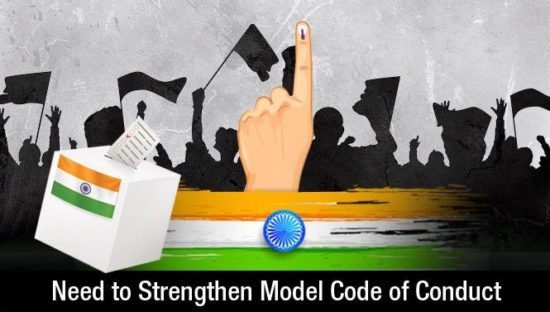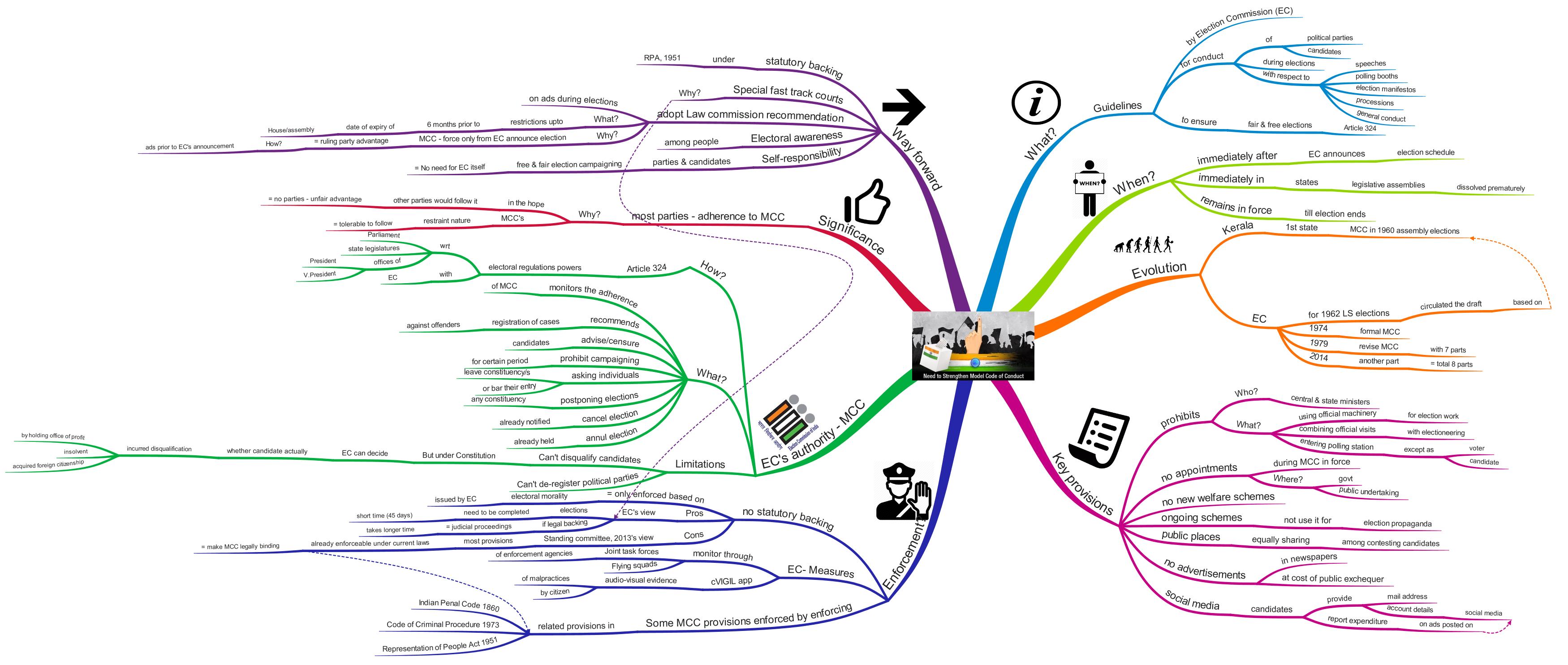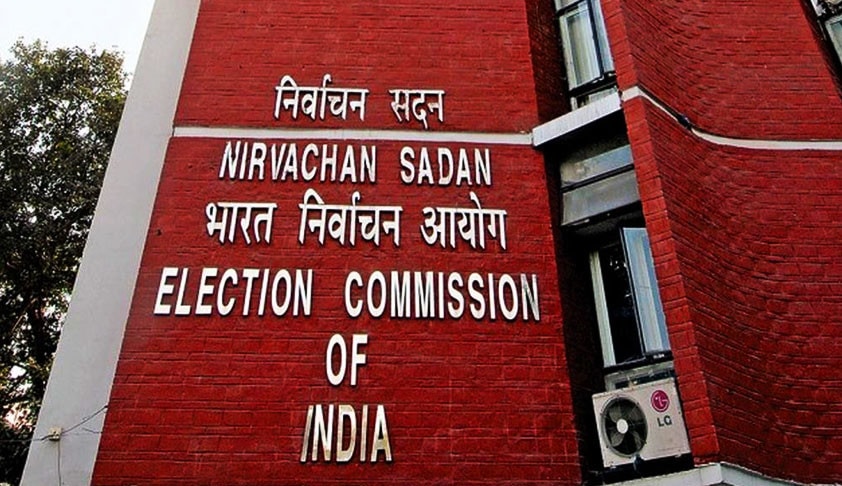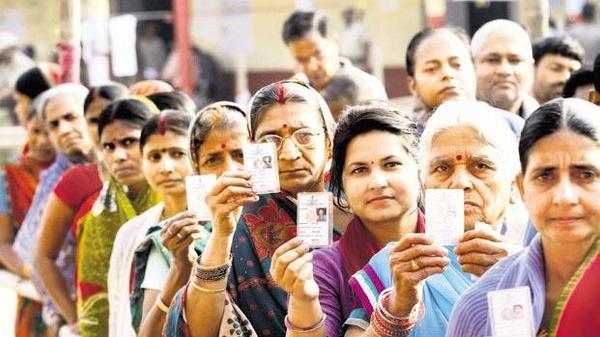Model Code of Conduct (MCC) – Why Need to Strengthen it?

The model code of conduct has been violated by many candidates and parties during campaigning for the Lok Sabha elections. It highlights the need to re-examine the enforceability of MCC and the authority of the election commission to take actions against such candidates and parties.
This topic of “Model Code of Conduct (MCC) – Why Need to Strengthen it?” is important from the perspective of the UPSC IAS Examination, which falls under General Studies Portion.
What is the Model Code of Conduct (MCC)?
- Model Code of Conduct (MCC) is the set of guidelines issued by the Election Commission of India (EC) for the conduct of political parties and candidates during elections especially with regards to speeches, polling day, polling booths, election manifestos, processions and general conduct.
- It is meant to ensure free and fair elections as per Article 324 of the Constitution.
- It comes into force
- Immediately after the announcement of election schedule by the EC.
- Immediately in states where legislative assemblies have been prematurely dissolved.
- It remains in force till the end of the electoral process.
When was the MCC introduced?
- Kerala was the first state to adopt a code of conduct for elections in 1960 assembly elections.
- The Election Commission decided to emulate Kerala’s example and circulated the draft among all recognised parties and the state governments for the Lok Sabha elections in 1962.
- In 1974, the EC issued a formal Model Code of Conduct.
- Just before the 1979 Lok Sabha elections, the EC issued a revised Model Code with seven parts, with one part devoted to the party in power and what it could and could not do once elections were announced.
- In 2014, EC introduced Part VIII on manifestos pursuant to the directions of the Supreme Court.
What do the 8 parts of MCC deal with?
- Part 1: Deals with general precepts of good behaviour expected from candidates and political parties.
- Part 2 and 3: Focus on public meetings and processions.
- Part 4 and 5: Describe how political parties and candidates should conduct themselves on the day of polling and at the polling booths.
- Part 6: About authority appointed by the EC to receive complaints on violations of the MCC.
- Part 7: About the political party in power.
- Part 8: Manifestos must be pursuant to the directions of the Supreme Court.
What are the key provisions of the Model Code of Conduct?
- It prohibits the central and state government ministers from using official machinery for election work and combining official visits with electioneering.
- Ad hoc appointments cannot be made in government or public undertaking during the time the code is in force.
- Ministers can’t enter any polling station or counting centre except in their capacity as a voter or a candidate.
- The code prohibits the government or incumbent party leaders from launching new welfare programmes like the construction of roads, provision of drinking water facilities, etc. or any ribbon-cutting ceremonies.
- But the code does not stand in the way of on-going schemes of development work or welfare, relief and rehabilitation measures meant for people suffering from drought, floods, and other natural calamities. EC forbids the use of these works for election propaganda.
- The code instructs that public spaces like meeting grounds, helipads, government guest houses, and bungalows should be equally shared among the contesting candidates. These public spaces should not be monopolised by a few candidates.
- It prohibits the issue of advertisement at the cost of public exchequer in newspapers during the election period.
What does it say about Social Media?
- In 2013 the EC laid down guidelines to regulate the use of social media by the parties and candidates.
- Under it, candidates have to provide their email address and details of accounts on Twitter, Facebook, YouTube, etc.
- Candidates have to add the expenditure on advertisements posted on social media to their overall expenditure for the election.
How does the MCC being enforced in India?
- The code does not have any statutory (legal) backing.
- It is only enforced based on rules of electoral morality issued by the EC.
- However, the absence of law does notprevent the Election Commission from enforcing it.
- The EC has devised several mechanisms to monitor the violation of the code such as joint task forces of enforcement agencies and flying squads.
- EC introduced cVIGIL mobile app through which audio-visual evidence of malpractices can be reported.
-
- ThecVIGIL App provides time-stamped, evidence-based proof of the Model Code of Conduct / Expenditure Violation, having live photo/video with auto location data.
- Any citizen can lodge a complaint through the Mobile App. Flying Squads will then investigate the matter and the Returning Officer takes the decision.
- Some provisions of the MCC may be enforced by enforcing related provisions in other laws like the Indian Penal Code, 1860, Code of Criminal Procedure,1973, and Representation of the People Act, 1951. For example,
- Inciting hatred through political speeches,
- Appealing to caste and community feelings of voters,
- Intimidating or bribing voters and
- distributing liquor or holding public meetings in the 48 hours preceding the close of polling,
- are all such offences for which candidates can be tried under the Indian Penal Code or the representation of the People Act 1951.
Why MCC should not be made legally enforceable?
In 2013, the Standing Committee on Personnel, Public Grievances, Law and Justice, suggested making the model code of conduct legally binding.
- The committee observed that most provisions of the code are already enforceable via corresponding provisions in other statutes.
- So it recommended that the MCC be made a part of the Representation of the People Act, 1951.
However, the EC argued against making it legally binding.
- According to EC, elections should be completed within a relatively short time or close to 45 days, and judicial proceedings generally take longer = it is not viable to make the MCC enforceable by law.
What is the authority of ECI with respect to MCC?
- Article 324:
- says the superintendence, direction, and control of all elections to Parliament, the State legislatures, and the offices of the President and Vice-President shall be vested in the EC.
- The Article has been interpreted by courts and by orders of the EC from time to time to mean that the power vested in it is plenary in nature (full in all respects).
- In other words, the EC can take any action it deems fit to ensure that elections and the election process are free and fair.
- The EC monitors the adherence of political parties and candidates to the ‘Model Code of Conduct’.
- If the violations are also offences under election law and the criminal law of the land = the EC can recommend registration of cases against the offenders.
- However, for some violations such as canvassing for votes during a period when electioneering is barred, making official announcements while the MCC is in force, and making an appeal to voters on sectarian grounds = the EC can advise or censure candidates, in addition to directing registration of cases.
- In some cases, the EC may prohibit campaigning of candidates or leaders for specified periods.
- Asking individuals to leave or barring entry into certain areas/constituencies are other powers that the EC may exercise.
- These powers are not necessarily traceable to any provision in the law, but are generally considered inherent because of the sweeping and plenary nature of the EC’s responsibility under the Constitution to ensure free and fair elections.
- Its powers also include postponing elections to any constituency, canceling an election already notified, and even to abrogate or annul an election already held.
What are the limitations of EC’s powers with respect to MCC?
- Disqualifying candidates: The EC does not have the power to disqualify candidates who commit electoral malpractices. At best, it may direct the registration of a case.
- However, the Constitution empowers the EC to decide whether a candidate has incurred disqualification by holding an office of profit under the appropriate government, or has been declared an insolvent, or acquired the citizenship of a foreign state.
- De-registering political parties: The EC does not have the power to deregister any political party for electoral violations.
How is the MCC significant in conducting free and fair elections?
- Though the Code doesn’t have any statutory basis, it has an indisputable legitimacy and parties across the political spectrum have generally adhered to its letter and spirit. This can be explained on the basis of modus operandi (routine) of MCC.
- The broad objectives of the code of conduct are to ensure a level playing field for all political parties, prevent conflicts between parties, and ensure law and order in the heat of election season.
- But the primary purpose is to ensure that the ruling party does not misuse or use to its advantage the government machinery for its election campaign purpose. This function of the code is the major reason for its indisputable legitimacy across all parties.
- Because each party follows the code in the hope that other parties, especially the ruling party, will also follow it and hence no party will gain unfair advantage in the elections.
- Another reason for the success of the code lies in its restrained nature that the parties find tolerable to follow.
What is the way forward?
Statutory Backing: MCC should be provided with statutory backing. It should be made a part of the Representation of the People Act, 1951. Because the legal provisions will make the MCC more powerful.
Special courts: Establishment of special fast track courts could solve the election MCC violation cases at a faster rate.
Govt advertisements: In 2015, the Law Commission in its report on Electoral Reforms observed that since the MCC comes into operation only from the date on which the Commission announces elections, the government can release advertisements prior to the announcement of elections = giving an advantage to the ruling party.
- Therefore, the Commission recommended that a restriction should be imposed on government-sponsored advertisements for up to six months prior to the date of expiry of the House/Assembly.
- However, it stated that an exception may be carved out for advertisements highlighting the government’s poverty alleviation programmes or any health-related schemes.
Awareness: Public need to be made more aware of the MCC, so they could punish those parties and candidates who do not adhere to it through their votes.
Self-responsibility: The parties and candidates should themselves practice free and fair election campaign without the need of code enforcement body i.e. the Election Commission.






